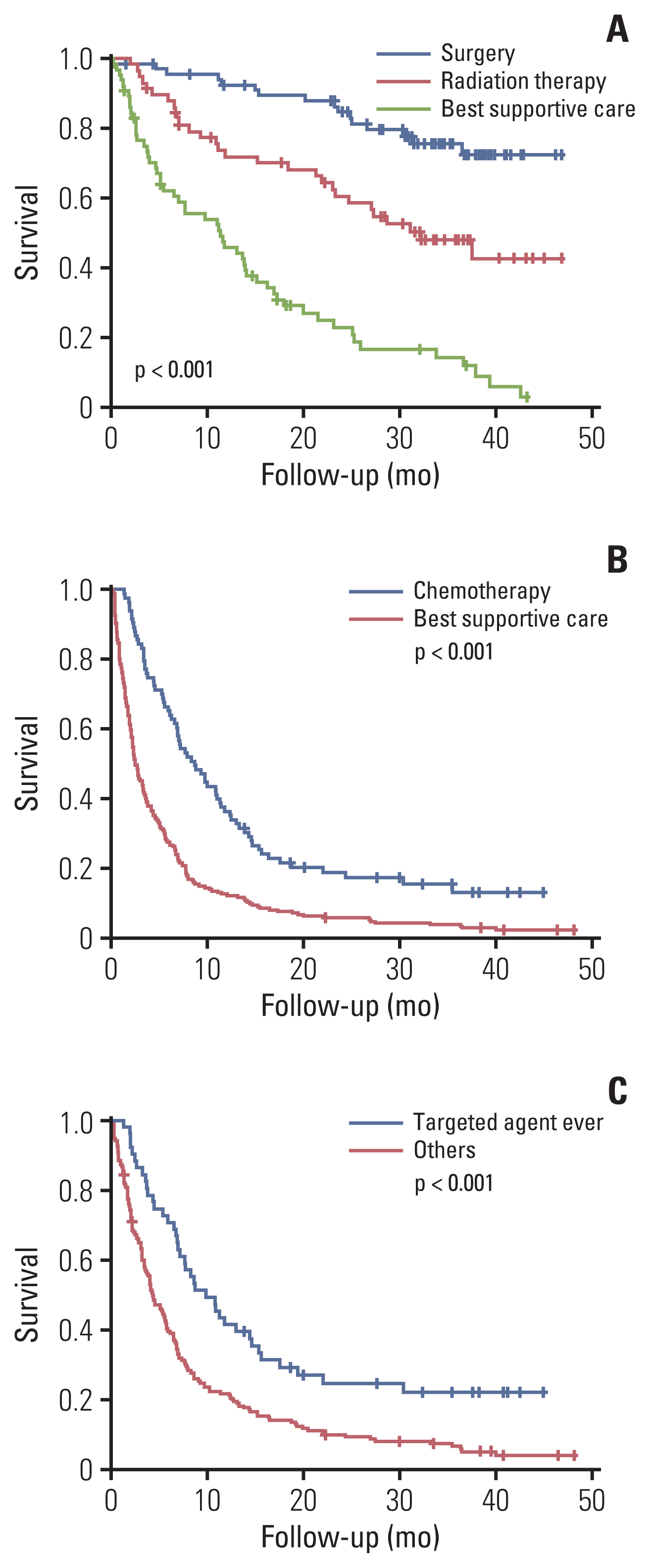Cancer Res Treat.
2021 Jan;53(1):104-111. 10.4143/crt.2020.894.
Active Treatment Improves Overall Survival in Extremely Older Non–Small Cell Lung Cancer Patients: A Multicenter Retrospective Cohort Study
- Affiliations
-
- 1Department of Pulmonary and Critical Care Medicine, Asan Medical Center, University of Ulsan College of Medicine, Seoul, Korea
- 2Department of Internal Medicine and Environmental Health Center, Kangwon National University Hospital, Chuncheon, Korea
- 3Department of Oncology, Asan Medical Center, University of Ulsan College of Medicine, Seoul, Korea
- KMID: 2510652
- DOI: http://doi.org/10.4143/crt.2020.894
Abstract
- Purpose
As the aging of society progresses, the proportion of extremely older lung cancer patients has also increased; However, studies of these patients with non–small cell lung cancer are limited. Therefore, we investigated the initial treatment modalities and survival outcomes for patients aged 80 years or over.
Materials and Methods
We included a multicenter retrospective cohort from the Korean Association for Lung Cancer Registry, which surveys 10% of the newly diagnosed lung cancer patients across 52 hospitals in Korea. We analyzed and compared the 2014–2016 data of the non–small cell lung cancer patients aged ≥ 80 years and those aged < 80 years.
Results
Of the 6,576 patients reviewed, 780 patients were aged ≥ 80 years, and 5,796 patients were aged < 80 years. In the patients aged ≥ 80 years, surgery and radiation therapy resulted in longer patient survival among those with a resectable tumor (stage I–II) than the best supportive care (median survival, not reached [surgery] vs. 32.2 months [radiation therapy] vs. 11.43 months [best supportive care]). The duration of survival in patients with advanced-stage (IV) lung cancers was higher after chemotherapy than after the best supportive care (median survival, 8.63 months vs. 2.5 months). Patients with stage IV adenocarcinoma who received targeted therapy had better survival than those who did not (median survival, 9.0 months vs. 4.3 months).
Conclusion
Even in extremely older patients, active treatments, such as surgery, radiation therapy, and chemotherapy, can result in better survival outcomes than the best supportive care.
Figure
Reference
-
References
1. Bray F, Ferlay J, Soerjomataram I, Siegel RL, Torre LA, Jemal A. Global cancer statistics 2018: GLOBOCAN estimates of incidence and mortality worldwide for 36 cancers in 185 countries. CA Cancer J Clin. 2018; 68:394–424.
Article2. Chen YM, Lai CH, Rau KM, Huang CH, Chang HC, Chao TY, et al. Advanced non-Small cell lung cancer patients at the extremes of age in the era of epidermal growth factor receptor tyrosine kinase inhibitors. Lung Cancer. 2016; 98:99–105.
Article3. Korean Statistical Information Service. Number of cancer occurrences, incidence rate by 24 carcinomas/sex/age (5 years) [Internet]. Daejeon: Korean Statistical Information Service;c2018. [cited 2020 Aug 10]. Available from: http://kosis.kr/statHtml/statHtml.do?orgId=117&tblId=DT_117N_A00-023&conn_path=I2 .4. Brown JS, Eraut D, Trask C, Davison AG. Age and the treatment of lung cancer. Thorax. 1996; 51:564–8.
Article5. Altundag O, Stewart DJ, Fossella FV, Ayers GD, Wei W, Zhou X, et al. Many patients 80 years and older with advanced non-small cell lung cancer (NSCLC) can tolerate chemotherapy. J Thorac Oncol. 2007; 2:141–6.
Article6. Presley CJ, Reynolds CH, Langer CJ. Caring for the older population with advanced lung cancer. Am Soc Clin Oncol Educ Book. 2017; 37:587–96.
Article7. Venuta F, Diso D, Onorati I, Anile M, Mantovani S, Rendina EA. Lung cancer in elderly patients. J Thorac Dis. 2016; 8:S908–S14.
Article8. Quoix E. Advanced non-small cell lung cancer in elderly patients. Breathe. 2012; 9:26–34.
Article9. Hurria A, Dale W, Mooney M, Rowland JH, Ballman KV, Cohen HJ, et al. Designing therapeutic clinical trials for older and frail adults with cancer: U13 conference recommendations. J Clin Oncol. 2014; 32:2587–94.
Article10. Davidoff AJ, Tang M, Seal B, Edelman MJ. Chemotherapy and survival benefit in elderly patients with advanced non-small-cell lung cancer. J Clin Oncol. 2010; 28:2191–7.
Article11. Booton R, Jones M, Thatcher N. Lung cancer 7: management of lung cancer in elderly patients. Thorax. 2003; 58:711–20.12. Lutz W, Sanderson W, Scherbov S. The coming acceleration of global population ageing. Nature. 2008; 451:716–9.
Article13. Choi CM, Kim HC, Jung CY, Cho DG, Jeon JH, Lee JE, et al. Report of the Korean Association of Lung Cancer Registry (KALC-R), 2014. Cancer Res Treat. 2019; 51:1400–10.
Article14. Oxnard GR, Fidias P, Muzikansky A, Sequist LV. Non-small cell lung cancer in octogenarians: treatment practices and preferences. J Thorac Oncol. 2007; 2:1029–35.
Article15. Lee K, Kim HO, Choi HK, Seo GH. Real-world treatment patterns for patients 80 years and older with early lung cancer: a nationwide claims study. BMC Pulm Med. 2018; 18:127.
Article16. Spencer KL, Kennedy MP, Lummis KL, Ellames DA, Snee M, Brunelli A, et al. Surgery or radiotherapy for stage I lung cancer? An intention-to-treat analysis. Eur Respir J. 2019; 53:1801568.
Article17. Park JY, Jang SH. Epidemiology of lung cancer in Korea: recent trends. Tuberc Respir Dis. 2016; 79:58–69.
Article
- Full Text Links
- Actions
-
Cited
- CITED
-
- Close
- Share
- Similar articles
-
- The Prognosis following Radiation Therapy or Surgical Resection for Stage 1 Non-Small Cell Lung Cancer
- Postoperative Radiation Therapy in Resected N2 Stage Non-Small Cell Lung Cancer
- Adjuvant Chemotherapy for Completely Resected Non-Small Cell Lung Cancer
- A case of leptomeningeal metastasis from adenocarcinoma of the lung improved by treatment with Gefitinib
- Clinical Characteristics of Patients Older than 76 with Lung Cancer


